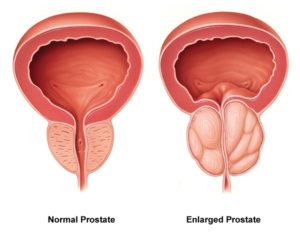Prostatic Enlargement
Benign Prostatic Hyperplasia or BPH is the most common condition that occurs in the prostate gland as men get older.
 BPH refers to non-cancerous prostate enlargement and is so common it can be considered part of the natural ageing process in men. In other words, virtually all men will develop some degree of prostate enlargement as they get older. The reasons why a man’s prostate enlarges with age are not fully understood, however sometimes there may be a family history of the condition, and more recent population studies suggest that diabetes and being overweight may affect the degree of BPH that occurs. BPH is not a preventable condition, but it’s important to understand that in most cases, it is not dangerous and most men with an enlarged prostate don’t need any treatment for it. However, about 30 percent of men may suffer symptoms from their prostate, such as:
BPH refers to non-cancerous prostate enlargement and is so common it can be considered part of the natural ageing process in men. In other words, virtually all men will develop some degree of prostate enlargement as they get older. The reasons why a man’s prostate enlarges with age are not fully understood, however sometimes there may be a family history of the condition, and more recent population studies suggest that diabetes and being overweight may affect the degree of BPH that occurs. BPH is not a preventable condition, but it’s important to understand that in most cases, it is not dangerous and most men with an enlarged prostate don’t need any treatment for it. However, about 30 percent of men may suffer symptoms from their prostate, such as:- increased difficulty passing urine-weaker flow or having to wait for urine to start flowing
- feeling that the bladder is not emptying properly
- needing to go to the toilet more frequently or urgently
- waking up at night to pass urine
Such symptoms can often interfere with sleep or affect a man’s work or daily activities, and can diminish your quality of life, so if you are experiencing these symptoms, it’s a good idea to speak to your local doctor.
The International Prostate Symptom Score or IPSS is a reliable way for doctors to assess the severity of a man’s symptoms and is useful in deciding what treatment they need, and whether the treatment has been effective.
CLICK HERE to download and fill out an IPSS.
Many men with mild BPH symptoms can be treated very effectively with lifestyle changes, medications, or minimally invasive surgery. Lifestyle changes include limiting your caffeine intake (coffee, tea, cola and energy drinks), avoiding fluid consumption before bedtime and drinking no more than 1-2 litres of fluid in total per day. Medications can be taken daily to improve urinary symptoms and can often provide many years fo relief. However, certain prostate medications can have undesired side-effects such affecting sexual function and libido, so men should discuss the pros and cons of medication with their local doctor or specialist before commencing treatment. Although so called “natural therapies” are extremely popular and heavily advertised, there really isn’t any convincing scientific evidence that they do anything at all!
A new treatment, called rezūm, is a minimally-invasive day surgery procedure, that can successfully and safely treat symptoms caused by BPH. rezūm uses heated water, or steam injections, to relieve prostate blockage, and is an excellent treatment option for many man.
Download a brochure about Rezum
